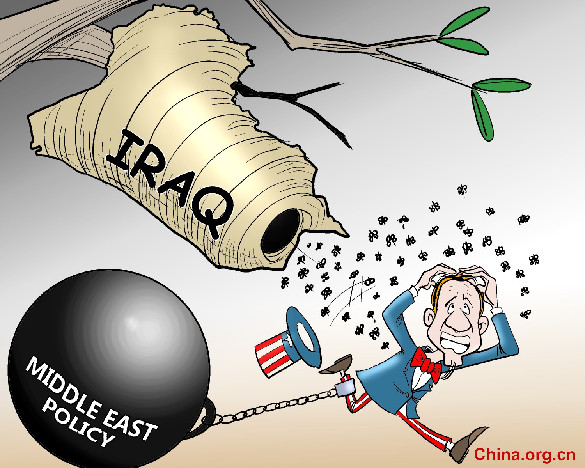Why is US war on terror failing?
- By Zhao Jinglun
 0 Comment(s)
0 Comment(s) Print
Print E-mail China.org.cn, September 4, 2014
E-mail China.org.cn, September 4, 2014
|
[By Jiao Haiyang/China.org.cn] |
It has been more than a dozen years since George W. Bush launched his global war on terror (GWOT). U.S. special forces killed Osama bin Laden and quite a few other prominent terrorists. But terror has not been vanquished. Instead, it is stronger than ever, as evidenced by the rise of the Islamic State (IS). There are other terror franchises in Somali, Yemen and many other places.
Why has the war on terror failed, or why it is not succeeding? Because terror is not primarily a military problem. Rather, it is a political problem. The geopolitical environment that gives rise to terrorism has not changed. It has enlarged and intensified.
Osama bin Laden once said he fought against the United States because the United States stationed troops in the Holy Land of Saudi Arabia and supported Israel in its occupation of Palestine and its bullying of the Palestinians.
In a comprehensive study of suicide bombing, or suicide terrorism around the globe --from Sri Lanka to the Middle East to the Caucasus, Robert Pape, professor of political science at the University of Chicago, came to the conclusion that "military occupation accounts for nearly all suicide terrorism around the world since 1980."
The U.S. occupation of Iraq has basically ended. But its aftermath is very much in evidence. It was that occupation that eventually gave rise to the Islamic State. (see my earlier columns)
Washington is still occupying Afghanistan -- an important source of Taliban and al-Qaeda terrorism.
The newest U.S Africa Command (AFRICOM) was established because Washington recognized the increasing strategic importance of Africa to the United States. It is also to fight terrorism. But it actually gave rise to more widespread terrorism in Africa.
Even before the formation of AFRICOM, there was the Trans-Sahara Counter-Terrorism Partnership established in 2005. Under its initiative, small teams of U.S. special forces trained the local soldiers in Chad, Mali, Mauritania and Niger, and worked with the armies of Algeria, Moracco, Nigeria, Senegal and Tunisia. To control what they called "under-governed spaces" of the Sahara, where people have been in various states of rebellion for years and more recently have been used by radical Islamist clerics and new terror groups.
In spite of these efforts, terrorism has not abated in Africa. A more recent example was the Boko Haram terrorist organization that kidnapped more than 200 teenage girls in Nigeria.
Unfortunately, the discussion of political causes is a taboo in United States and its European allies. Instead they emphasize the cultural and ideological roots of modern jihad: that there is something amiss in Islam itself. But radical jihad does not represent modern Islamism.
The causes of the rise of radical Islam are complex. That IS succeeded in recruiting fighters even from the United States and Europe -- reportedly there are some 2,000 of them -- is largely because these young men see no opportunity for their development in those societies.
As long as the political environment remains unchanged, terrorism will continue to be a serious threat.
The author is a columnist with China.org.cn. For more information please visit: http://www.china.org.cn/opinion/zhaojinglun.htm
Opinion articles reflect the views of their authors, not necessarily those of China.org.cn.







Go to Forum >>0 Comment(s)